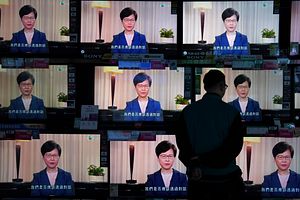Hong Kong Chief Executive Carrie Lam announced Wednesday the government will formally withdraw an extradition bill that sparked months of demonstrations, bowing to one of the protesters’ demands in the hope of ending the increasingly violent unrest.
But lawmakers warned that the bill’s withdrawal was not enough to end the turmoil, which has increasingly focused on alleged police brutality against protesters and democratic reforms. A youth activist also rejected the move as insincere and warned it could be a precursor to a clampdown.
The bill would have allowed Hong Kong residents to be sent to mainland China for trials. It has prompted massive protests since June that disrupted transport links and caused the airport to shut down earlier this month.
Lam said the government would not accept other demands including an independent inquiry into alleged police misconduct and the unconditional release of those detained. Instead, she named two new members to a police watchdog agency investigating the matter.
“The government will formally withdraw the bill in order to fully allay public concerns,” she said in a recorded television message.
She said the persistent violence is damaging the rule of law and that challenges to the “one country, two systems” policy had put Hong Kong in a “highly vulnerable and dangerous situation.”
“Our foremost priority now is to end violence, to safeguard the rule of law and to restore order and safety in society,” she added, vowing to “strictly enforce the law against all violent and illegal acts.”
Lam said it was clear that public frustration has gone far beyond the bill and that her government will seek a dialogue with aggrieved groups to “address the discontent in society and to look for solutions.”
She said she will also invite community leaders, professionals and academics to examine deep-seated problems in the society and advise the government on solutions.
“Let’s replace conflicts with conversations, and let’s look for solutions,” she said.
Lam made the announcement after meeting with pro-government lawmakers and members of the National People’s Congress and the Chinese People’s Political Consultative Conference.
Lawmaker Michael Tien, who was at the meeting, said the move would not change public sentiment if it isn’t accompanied by other concessions.
“It is too little, too late. The focus now has completely shifted. Most people do not remember what the bill is about but are more concerned about the escalating violence and alleged police heavy-handedness against protesters,” he said.
He said Lam rejected his call during the meeting for an independent inquiry which would have the power to summon witnesses, on the ground that it would overlap with the police watchdog probe.
Pro-democracy lawmaker Claudia Mo said the protesters are adamant that all their demands, including calls for direct elections, are fulfilled. She mocked Lam’s bid to seek dialogue to address public grievances.
“She has been fast asleep these three months, this is just absurd,” Mo said. “The scars and wounds are still bleeding, and she thinks she can just use some garden hose to put out the hill fire. That is not acceptable.”
Prominent pro-democracy youth activist Joshua Wong said the government in Beijing hoped to cool down the protests by withdrawing the bill, “But our determination and courage to fight for freedom will still continue.”
“I hope the people in China can understand that democracy, freedom and human rights are universal values that Hong Kong people are fighting for,” he told journalists before a forum in Taipei, Taiwan, where he is visiting. “We will continue to fight for it. I hope there is one day that Hong Kong and even China would become a place where people can enjoy democracy and freedom.”
Pro-establishment lawmaker Starry Lee, however, urged protesters to accept the government’s olive branch so the city can move forward.
The Hong Kong stock market soared 4 percent, boosted by reports of the bill’s withdrawal.
Lam has come under withering criticism for pushing the extradition bill, which many in Hong Kong see as an example of the city’s eroding autonomy since the former British colony returned to Chinese control in 1997.
She was elected as Hong Kong’s chief executive by a pro-Beijing committee of Hong Kong elites, and the mainland government has spoken in support of her government and the city’s police force throughout the protests.
Clashes between police and protesters have become increasingly violent, with demonstrators throwing gasoline bombs and rods at officers in protests last weekend. Authorities in turn have employed water cannons, tear gas, rubber bullets and batons. More than 1,100 people have been detained.
The mostly young protesters say that a degree of violence is necessary to get the government’s attention after peaceful rallies were futile. In Beijing, the mainland office responsible for Hong Kong has warned that China will “not sit idly by” if the situation worsens.
The prolonged protests have hurt Hong Kong’s economy amid a slowdown in the Chinese economy and its trade war with the United States.
Hong Kong and foreign companies have also been under intense pressure to support China’s ruling Communist Party against the protesters.
The chairman of Hong Kong’s Cathay Pacific Airways resigned Wednesday, becoming the second top figure to leave the airline since the protests erupted.
Cathay said John Slosar was retiring from the airline, one of Hong Kong’s most prominent businesses. It comes less than one month after Cathay’s CEO, Rupert Hogg, resigned following pressure by Beijing over participation by some of the carrier’s employees in protests.
By Katie Tam for the Associated Press.
Associated Press journalists Joe McDonald in Beijing, Eileen Ng in Kuala Lumpur, Malaysia, and Johnson Lai in Taipei, Taiwan, contributed to this report.
































